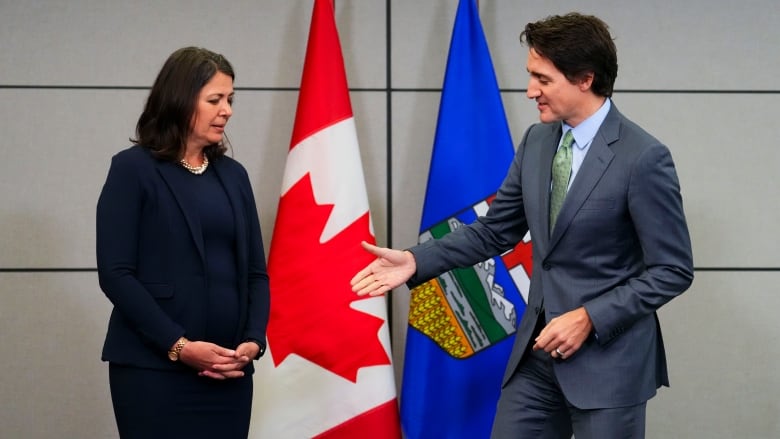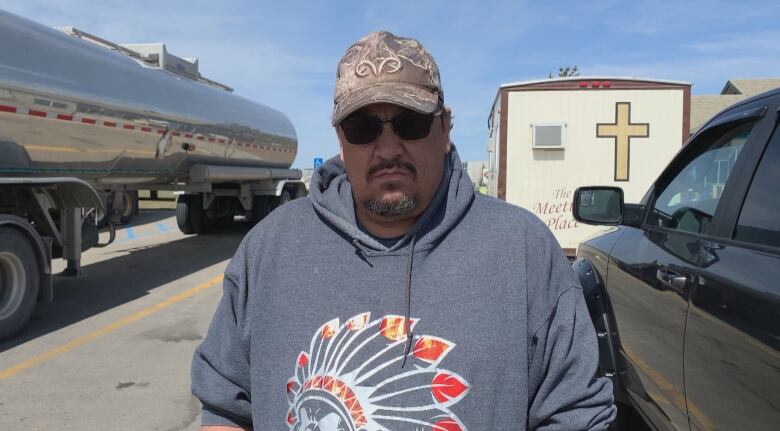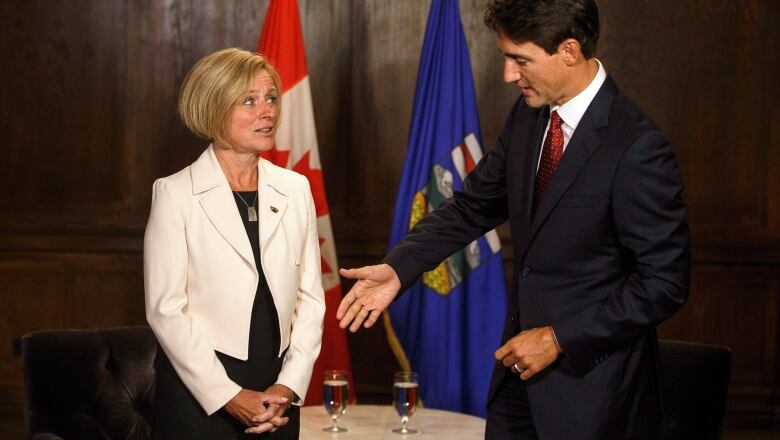Fending off Ottawa may be an Alberta staple, but it's not an election issue this time
'We don't have the luxury in 2023 to think about federal-provincial fighting,' one voter said

It was barely half a year ago when UCP Leader Danielle Smith proclaimed: "We need less Ottawa in our lives."
NDP Leader Rachel Notley spoke about her "frustrations" and the "legitimate concerns" with the feds last fall, too.
Those familiar Alberta battle cries have fallen almost completely silent in this provincial election, in favour of a focus on affordability and health care.
When the public is focused on economic and energy development, polling shows there's a greater appetite for a fight.
But the trends from the last election that oxygenated anti-Ottawa sentiment haven't repeated themselves in this campaign. High costs of living and anxiety around the health-care system are the new generation of preoccupations.
"Things day to day are more difficult than in 2019," said Tamara Keller, a voter and agricultural marketing specialist in Calgary.
"We don't have the luxury in 2023 to think about federal-provincial fighting."
Alberta is also receivingfederalhelp with the ongoing wildfires. Andchild-care funding. And a multibillion-dollar health deal.
Jostling between the two governments can look like rebounding in basketball: Sometimes the best strategy is to box out your opponent and sometimes it's better to hustle back on defence.
Who does what in whose backyard?
Often the bombastic sparring matches between the two are about getting leverage or establishing jurisdiction or as former Alberta envoy to Ottawa Alan Ross puts it, "Who does what in each other's backyard."
When disaster strikes or there's no capital to be gained from a quarrel,voila, co-operation.
Who would have foreseen Smith and Prime Minister Justin Trudeau collaborating in the midst of a tight election campaign?
Or this fun factoid: With Smith's campaign HQ on federal land at the Calgary airport's corporate centre, Ottawa is the United Conservative Party'slandlord for the month of May.
Disdain for the feds may be taking a back seat in this campaign, but many questions about Alberta's future can be connected back to the federal government: an ongoing legal challenge to energy project legislation, an attempt to quietly lock in the equalization formula, $24 billion over a decade for health care, the clumsy unveiling of an energy transition plan.

"I'm Indigenous, and seeing all this money go away when it could help anybody here, that's the biggest thing for me," trucker Garth Thiberttold CBCNews.
"We are rich in oil, tap it. We will earn a lot of income for the whole of Canada," Ulyses Sasam, a voter in northeast Calgary, urged the federal government.
A force in 2019, a blip in 2023
In an election where a handful of seats in Calgary will likely decide the next government, the federalism conundrum barely registers.
Just four per cent of people in the city mentioned the federal government or Trudeau as theirtop concern, and only another three per cent said it ranked as one of their major issues, according to a poll conducted this spring. In fact, people said they were more concerned about the provincial government and its current leadership.
The frustrations some Albertans feel with Ottawa are real and their history long, but it's not translating into pledges from the UCP or NDP.
"Most people want a government who's got the judgment and the sense to know when to hang tough and fight with the government and also have the sense to know when to co-operate," said Janet Brown, who leads Janet Brown Opinion Research.
"In 2019, there were just way more things to fight about with the federal government."
That election was tinged with outstanding questions about the constitutionality of the federal carbon tax and the future of pipelines like Trans Mountain and Keystone XL. Those matters have all but evaporated.
The parties are mostly avoiding invoking policies on Alberta autonomy in this campaign, but momentary silence on the matter may not equal lasting peace.
Both Notley and Smith have vocally opposed Ottawa's proposals on "Just Transition" sustainable jobs and an emissions cap.
Shortly after Smith became premier, the legislature approved apared down, revised version of her Alberta Sovereignty Act a law that says the province can disregard federal decisions deemed against the province's interests.
The bill hasn't been mentioned once in the nascent days of this election campaign. It's never been used. Other UCP autonomy-related musings like ditching the RCMP and leaving the Canada Pension Plan also won't be put to voters.
The UCP is invoking the spectre of the federal government in its attack ads, tying Notley to Trudeau and federal NDP Leader Jagmeet Singh.

Notley and her party have expressed exasperation with the federal government, too, though they've been equallysilent during the campaign.
"I know that Albertans are sometimes frustrated by our relationship with the federal government, and many times I share that frustration," she told supporters at the NDPconvention in October.
"We have legitimate concerns about specific issues with Ottawa, like the fiscal stabilization formula and Bill C-69."
Requests for comment to the federal government and Official Opposition were not returned.
Expect flared temperson net-zero policies
An Environics Institute study from this spring also found Albertans are feeling less western alienation than when things peaked in 2019, but that change is mostly in NDP voters. There was almost no change among UCP supporters.
"There's this expectation sometimes that provincial premierscan play the Ottawa card, stand up for the province against the federal government, and that's a great way to bring people from different political backgrounds under their tent. What we're seeing is that's actually not working in Alberta right now," said Andrew Parkin, the executive director of the institute.
Feelings of western alienation exacerbated by things like the pandemic and natural resource debates could intensify again as governments push toward a net-zero future for emissions.
"These issues, I think, are going to be there no matter who gets in. I do think climate policy is going to be a key issue," said Ross, who is also a managing partner at Borden Ladner Gervais.
"Equally, I think, there will be opportunities no matter who gets in to be able to work with both levels of government on energy transition and infrastructure."
Ottawa may not become a fixture in this election campaign, but whoever sits in the premier's office after May 29 will have to manoeuvre two jurisdictions' different visions of what's on Alberta's to-do list for the coming years.












_(720p).jpg)


 OFFICIAL HD MUSIC VIDEO.jpg)
.jpg)



























































































